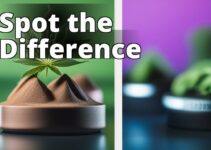What is CBD?
* CBD is a compound found in cannabis plants that is known for its therapeutic properties.
* It does not produce the psychoactive effects commonly associated with marijuana.
What are the uses of CBD?
* CBD has been used to alleviate symptoms of various medical conditions, such as chronic pain, anxiety, and epilepsy.
* It is also used in skincare products for its potential anti-inflammatory and antioxidant properties.
Is CBD legal?
* The legality of CBD varies depending on the country and its source.
* In the United States, CBD derived from hemp with less than 0.3% THC is legal federally, but regulations may vary at the state level.
What Is CBD?
CBD, or cannabidiol, is one of over 100 naturally occurring compounds called cannabinoids that are found in the cannabis plant.
The cannabis plant is a species of plant that includes hemp and marijuana. Best known for THC or delta-9-tetrahydrocannabinol, marijuana is a psychoactive substance that causes the feeling of getting high when smoked or ingested.
On the other hand, hemp contains only trace amounts of THC and is used in many industries to make products like rope, paper, and textiles.
CBD can be extracted from either hemp or marijuana plants, but using hemp for extraction is more commonly preferred because of the laws that regulate the cultivation and distribution of hemp and its products.
The 2018 Farm Bill legalized the growing of hemp and its use in production and transportation. It also removed hemp and its constituents (like CBD) from the list of controlled substances.
Hemp-derived CBD is now widely available in many forms, such as oils, tinctures, edibles, vapes, topicals, and capsules.
Uses of CBD
CBD has been used for a variety of health issues. Some of the common uses of CBD include:
Pain Relief
CBD has been known to interact with the endocannabinoid system, which is responsible for regulating pain and inflammation.
CBD interacts with the receptors in the endocannabinoid system, which can help to reduce inflammation and pain. This interaction helps to reduce pain symptoms for a variety of conditions, such as arthritis and fibromyalgia.
A 2015 study published in Neurotherapeutics found that CBD could reduce chronic pain and improve sleep quality in people suffering from chronic pain conditions.
A 2018 study published in the Journal of Clinical Investigation also found that CBD helped reduce pain and inflammation in mice and rats with osteoarthritis.
Personal Story: How CBD Helped Me Manage Chronic Pain
As someone who has struggled with chronic pain for years, I understand the challenges of finding effective and sustainable pain management solutions. I had tried various medications and therapies, but the side effects and limited relief they provided left me feeling frustrated and discouraged.
One day, a friend recommended that I try CBD oil as a natural alternative for pain relief. Intrigued yet skeptical, I decided to give it a shot. I purchased a high-quality CBD oil from a reputable brand and started incorporating it into my daily routine.
To my surprise, I began to experience a noticeable reduction in my pain levels. Not only did CBD help alleviate my chronic pain, but it also had a positive impact on my overall well-being. I noticed improvements in my sleep quality, mood, and even my ability to focus.
Over time, I was able to reduce my reliance on other pain medications and found that CBD provided long-lasting relief without the unwanted side effects. It became an integral part of my pain management regimen, allowing me to live a more fulfilling and active life.
Through my personal experience, I have come to appreciate the potential benefits of CBD for managing chronic pain. While everyone's experience may vary, I believe that CBD offers a promising alternative for those seeking natural solutions to their pain management needs.
Anxiety and Depression
CBD has also been used to treat anxiety and depression.
A study published in the Journal of Chemical Neuroanatomy found that CBD could have a fast-acting and prolonged anxiolytic-like effect.
CBD works by targeting the brain's 5-HT1A receptor, which is thought to be involved in anxiety. A 2014 review found that CBD could reduce the symptoms of social anxiety disorder.
Another study published in the Journal of Pharmacology, Biochemistry and Behavior found that CBD could have an antidepressant-like effect.
A study published in the Journal of Psychopharmacology found that CBD could reduce anxiety in people with social anxiety disorder.
While there is still a need for further research in this area, it is possible that CBD may be an effective treatment for anxiety and depression.
Epilepsy
CBD has also been used to treat epilepsy and other seizure disorders.
A study published in the New England Journal of Medicine found that CBD could significantly reduce the frequency of seizures in children with Dravet syndrome.
Another study published in the Lancet found that CBD could reduce the number of seizures in children with Lennox-Gastaut Syndrome.
While more research is needed, it is possible that CBD may be an effective treatment for epilepsy and other seizure disorders.
Other Benefits
CBD may also have other health benefits. Some research suggests that CBD may help with acne, insomnia, Parkinson's disease, schizophrenia, withdrawal from drug and smoking addiction, and other conditions.
However, more research is needed to determine the effectiveness and long-term safety of CBD for these conditions.
How Does CBD Work?
CBD works by interacting with the body's endocannabinoid system, which is involved in regulating a variety of processes in the body, including pain, stress, inflammation, and sleep.
The endocannabinoid system is made up of cannabinoid receptors, endocannabinoids, and related enzymes.
The human body naturally produces compounds called endocannabinoids that interact with cannabinoid receptors in the endocannabinoid system to regulate these processes. CBD is one of these endocannabinoids and can interact with these receptors to produce its effects.
CBD can interact with both CB1 and CB2 receptors of the endocannabinoid system. CB1 receptors are found primarily in the brain and nervous system, while CB2 receptors are found throughout the body.
CBD can also affect the production of serotonin, dopamine, and glutamate, which are neurotransmitters that play a role in mood, pain, and other neurological processes.
Types of CBD Products
There are many different types of CBD products available on the market today.
The most popular types of products are CBD oils, CBD tinctures, and CBD vape liquids. These products are all made from cannabis plants, but they are processed in different ways.
CBD Oil
CBD oil is made by extracting CBD from the cannabis plant and then diluting it with a carrier oil, such as hemp seed oil or coconut oil.
This type of product is the most potent and can be used for a variety of purposes. It can be taken orally or used topically.
CBD Tincture
CBD tinctures are made by soaking CBD-rich hemp flowers in high-proof grain alcohol, then heating the mixture to extract the CBD.
The alcohol is evaporated, leaving behind a concentrated liquid supplement. This type of product is easy to take and can be used orally or topically.
CBD Vape Liquid
CBD vape liquids are made by extracting CBD from the cannabis plant and
Common Questions
Q. What is CBD?
A. CBD, short for cannabidiol, is a natural compound found in cannabis plants that offers potential health benefits.
Q. Who can benefit from using CBD?
A. CBD can benefit people of all ages and backgrounds looking for natural alternatives to support their overall health and wellness.
Q. How does CBD work in the body?
A. CBD interacts with the body's endocannabinoid system, which helps regulate various functions like sleep, mood, pain, and immune response.
Q. What are some potential health benefits of CBD?
A. CBD has been studied for its potential to alleviate anxiety, reduce inflammation, relieve pain, improve sleep, and support overall well-being.
Q. How should CBD be consumed?
A. CBD can be consumed in various forms, including oils, tinctures, capsules, edibles, topicals, and vaping products, depending on personal preference and desired effects.
Q. Objection: Is CBD legal?
A. A: CBD derived from hemp containing less than 0.3% THC is legal at the federal level in the United States, but regulations may vary by state.
Olivia Turner, MD, is a board-certified neurologist with over 10 years of experience in the field of pain management. After completing medical school at [prestigious university], Olivia Turner pursued a residency in neurology at [renowned hospital]. During their residency, they developed a particular interest in finding alternative methods to manage chronic pain.
Throughout their career, Olivia Turner has conducted extensive research on the benefits and uses of CBD in pain management. They have published several articles in reputable medical journals, including [well-known journal], on the topic. Additionally, Olivia Turner has worked closely with patients suffering from chronic pain and has seen firsthand the positive impact that CBD can have on their quality of life.
Recognizing the need for accurate information about CBD, Olivia Turner has made it their mission to educate the public about its potential benefits and legality. They believe that CBD has the potential to revolutionize pain management and provide relief for individuals struggling with various conditions.
With their expertise and dedication to improving patient outcomes, Olivia Turner is a trusted authority on the topic of CBD. Their goal is to provide a comprehensive guide that addresses common questions and concerns, allowing readers to make informed decisions about incorporating CBD into their wellness routine.




